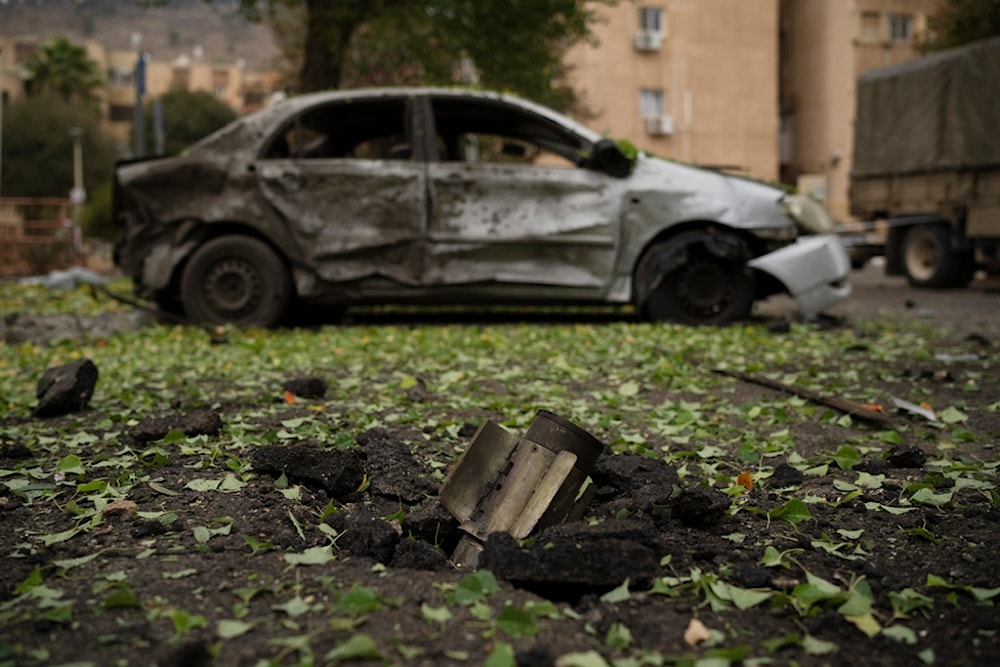As Lebanese people return south, Israeli settlers mourn security loss
As Lebanese citizens return to their homes in the South, Israeli settlers along the northern border express their concerns over the lack of security.
-

A rocket fired from Lebanon during the hours before the start of the ceasefire sits wedged in the ground next to a damaged car in Kiryat Shmona, northern occupied Palestine, November 27, 2024 (AP)
After the ceasefire agreement between Lebanon and "Israel" took effect early Wednesday, without the occupation entity being able to impose its conditions on Hezbollah, dissatisfaction with the deal continues to grow among Israeli settlers and officials.
While Lebanese citizens have been returning to their villages and towns in the south, reaching the border with occupied Palestine since the agreement's implementation began, Moshe Davidovich, head of the Forum of Settlements along the border of occupied Palestine with Lebanon, admitted that "there is no safe return for settlers to the north," pointing out that this was one of the war's objectives.
Davidovich described the day the agreement was signed as a "sad day" for settlers in the north, emphasizing that "there is no victory in this agreement. It's not Resolution 1701—it’s one-nil in favor of Hezbollah."
Meanwhile, former spokesperson for the Israeli occupation forces, Ronen Manelis, dismissed Israeli occupation Prime Minister Benjamin Netanyahu's claims that "Israel has pushed Hezbollah 15 kilometers from the border fence and that they will not be present south of the Litani River," calling these claims "utter nonsense".
Manelis stressed that "the residents of southern Lebanese villages are Hezbollah," adding, "Hezbollah is inside this region (south of the Litani), and this cannot be changed."
These remarks align with admissions by former Chief of Military Intelligence, Tamir Hayman, who stated that "the Israeli Army failed to achieve any of its objectives" in the war on Lebanon.
Hayman acknowledged that Hezbollah fighters demonstrated, through their bold combat, that "the rules of engagement are determined solely on the battlefield."
Israeli Channel 14 also condemned the sight of Lebanese citizens returning to their southern villages and towns, despite the Israeli occupation forces spokesperson's threats.
In this context, Avihay Stern, mayor of the settlement Kiryat Shmona, expressed dissatisfaction with the idea of "settlers returning to the north like cattle to slaughter."
In turn, David Azulai, head of Metulla, criticized the Israeli government for abandoning northern settlers to their fate.
Additionally, it was reported that Amit Sofer, head of the Merom HaGalil Regional Council, had also stated that the ceasefire agreement "provides calm, not security," adding, "No one wants to live in a place where there is no security."
Moreover, an Israeli lawmaker and member of Prime Minister Benjamin Netanyahu's Likud Party, Amit Halevi, stated that all indicators suggest there was "no absolute victory in Lebanon."
Halevi blasted the ceasefire deal, saying that it "solidifies Hezbollah's power in Lebanon."
Defying IOF warnings, Lebanese continue heading home, arrive at towns
Al Mayadeen’s cameras documented the historic return of forcibly displaced residents from South Lebanon, the Bekaa Valley, and the Southern Suburb of Beirut, as they made their way back to their homes and villages. This significant movement began Wednesday morning, following the implementation of the ceasefire.
The scenes depicted a powerful image of resilience and recovery, as families returned to areas that had long been under Israeli aggression.
The footage highlighted both the emotional and symbolic significance of the return, as Lebanese people hailed the Resistance and celebrated victory, while also mourning their martyred leader, Sayyed Hassan Nasrallah.
من #الغازية، أهالي #جنوب_لبنان في طريقهم إلى قراهم وبلداتهم.@AlMayadeenNews #الميادين_لبنان #لبنان pic.twitter.com/Z8wVXAXcwR
— الميادين لبنان (@mayadeenlebanon) November 27, 2024
In interviews for Al Mayadeen's correspondents, returning Lebanese citizens expressed pride in their resilience, declaring, "We triumphed through our determination, steadfastness, and Resistance."
They highlighted that while settlers have not returned to the northern settlements, the people of the South, Bekaa, and Southern Suburb are now making their way back. "The enemy bet on schism and civil war, but it has failed," they added, referring to the unity exhibited by most of the Lebanese people from all sects and factions by embracing the displaced.
Read more: Israeli forces achieved no goals in Lebanon: Former Aman chief

 4 Min Read
4 Min Read








